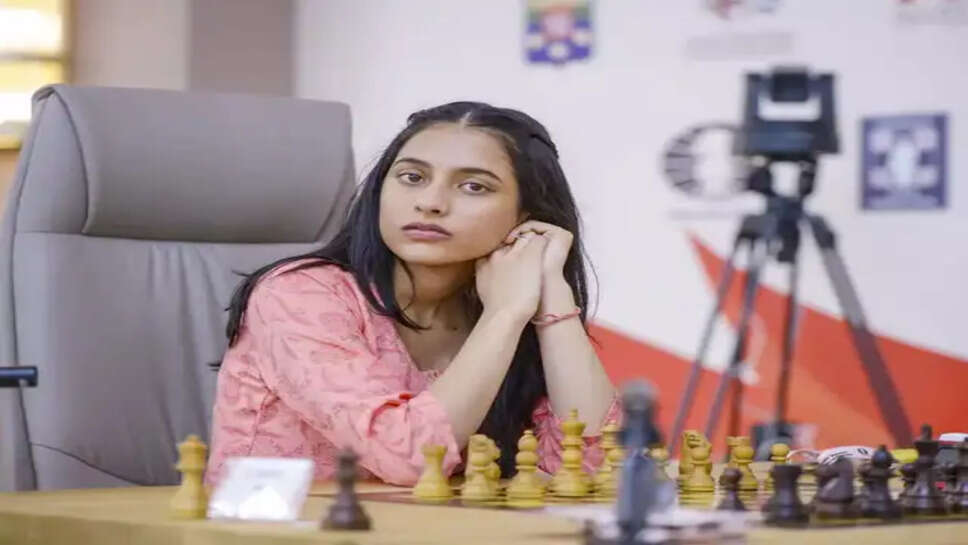Divya Deshmukh Talks Confidence, Pressure, and Fame After World Cup Triumph

Just weeks ago, Divya Deshmukh was a talented but relatively under-the-radar teen chess prodigy. Now, she’s a household name in India’s sporting circles. After claiming the FIDE Women’s World Cup title with a dominating performance that stunned seasoned international players, the 18-year-old finds herself navigating a new world of attention, interviews, and accolades.
In this candid interview, Divya reflects on the moment her life changed, the pressures of being young in a high-stakes sport, and how she’s staying grounded despite the sudden spotlight.
The Moment of Victory
“I knew I had played well,” she begins, her tone composed but still carrying the awe of that winning moment. “But it didn’t hit me until the final game ended. I wasn’t expecting this level of attention. I thought it would be just another tournament, maybe a stepping stone. I had no idea it would define my career so early.”
At the FIDE Women’s World Cup, Deshmukh battled through a fiercely competitive field, defeating players ranked much higher and more experienced than her. Each victory added fuel to the buzz, and by the time she entered the semifinals, the Indian chess world was already abuzz with her name.
Overnight Fame and Changing Realities
The day after the victory, Divya says her phone didn’t stop ringing.
“I woke up to hundreds of messages. People I hadn’t heard from in years. Everyone—from my old school teachers to cricketers and actors—was posting about me. It was surreal.”
The newfound fame has come with new challenges: media engagements, official ceremonies, and the pressure of being seen not just as a promising player, but as a national symbol of excellence.
“It’s weird when people start treating you differently,” she admits. “Some are super supportive, but others now expect me to win everything, all the time.”
A Journey Fueled by Passion and Patience
Born and raised in Nagpur, Divya started playing chess at the age of 6. Her parents quickly noticed her sharp memory and problem-solving abilities, and enrolled her in local tournaments. Success followed rapidly, but it wasn’t an easy ride.
“I’ve been doing this since I was a kid. When other children were going to birthday parties, I was studying endgames or traveling to tournaments. It was hard sometimes, but I’ve never regretted it.”
Her parents, both working professionals, supported her dreams wholeheartedly, ensuring that her academics didn’t suffer while allowing her to pursue chess seriously. “They never pushed me too hard. It was always my decision to play more, to compete.”
Mental Strength Over Elo Ratings
One of the striking things about Divya’s game is her composure. Despite facing some of the world’s most aggressive players, she remained unshaken, calmly calculating her way through complex positions.
When asked about it, she smiles: “I’ve lost so many games in my life. So many heartbreaks. You just learn to detach emotionally. It’s about making the best move in that moment, not worrying about your reputation or ranking.”
Her coach, who has worked with several Indian grandmasters, says her greatest asset is her mental resilience. “She doesn’t tilt. You’ll never see her panic over a lost pawn. She plays with clarity and conviction.”
Dealing with Pressure and Social Media
Post-victory, Deshmukh has gained a massive social media following. While she appreciates the support, she also recognizes the downside.
“I get trolled sometimes. If I lose a match, people immediately say things like ‘fluke winner’ or ‘overrated.’ I try not to let it get to me, but I’m still learning how to deal with all that.”
To keep her balance, she avoids reading comments on most posts and uses her social platforms mostly for updates and thanking fans.
“I want to stay connected, but not consumed,” she says firmly.
Chess as a Career and India’s Rise
With India now producing chess champions at an astonishing pace, Divya’s victory is yet another symbol of the country’s growing dominance in the sport. With stalwarts like Viswanathan Anand laying the foundation and young stars like R Praggnanandhaa, Nihal Sarin, and Gukesh D making waves, Divya sees herself as part of a “golden generation.”
“India’s chess ecosystem is booming now,” she notes. “We have better coaching, better technology, and most importantly, more belief. When I started out, it was rare to see teenage grandmasters. Now, it’s almost expected.”
She acknowledges that her success wouldn’t have been possible without that supportive ecosystem—and hopes to give back one day by mentoring young girls.
“Girls are still underrepresented in chess. I want to show them that you don’t have to give up your dreams, no matter how niche or nerdy they seem.”
What’s Next for Divya?
Despite her recent success, Divya isn’t slowing down. She has already started preparing for upcoming tournaments including the Asian Women’s Championship and the Olympiad next year. Her training schedule remains rigorous, often involving six to eight hours of study, strategy analysis, and practice games each day.
“I’m focusing more on improving my positional play. I still have a lot to learn, and I want to evolve—not just as a player, but as a person.”
She’s also working on a chess-themed YouTube channel, aiming to make the game more accessible and fun for the next generation.
The Same Girl at Heart
When asked how she’s changed since winning the World Cup, Divya chuckles.
“Honestly? I still wear the same track pants at home. I still fight with my brother over the TV remote. I just happen to be the FIDE World Cup champion now.”
And that, perhaps, is what makes Divya Deshmukh so refreshing. A world champion with her feet planted firmly on the ground—confident, clear-eyed, and quietly changing the game, one move at a time.
